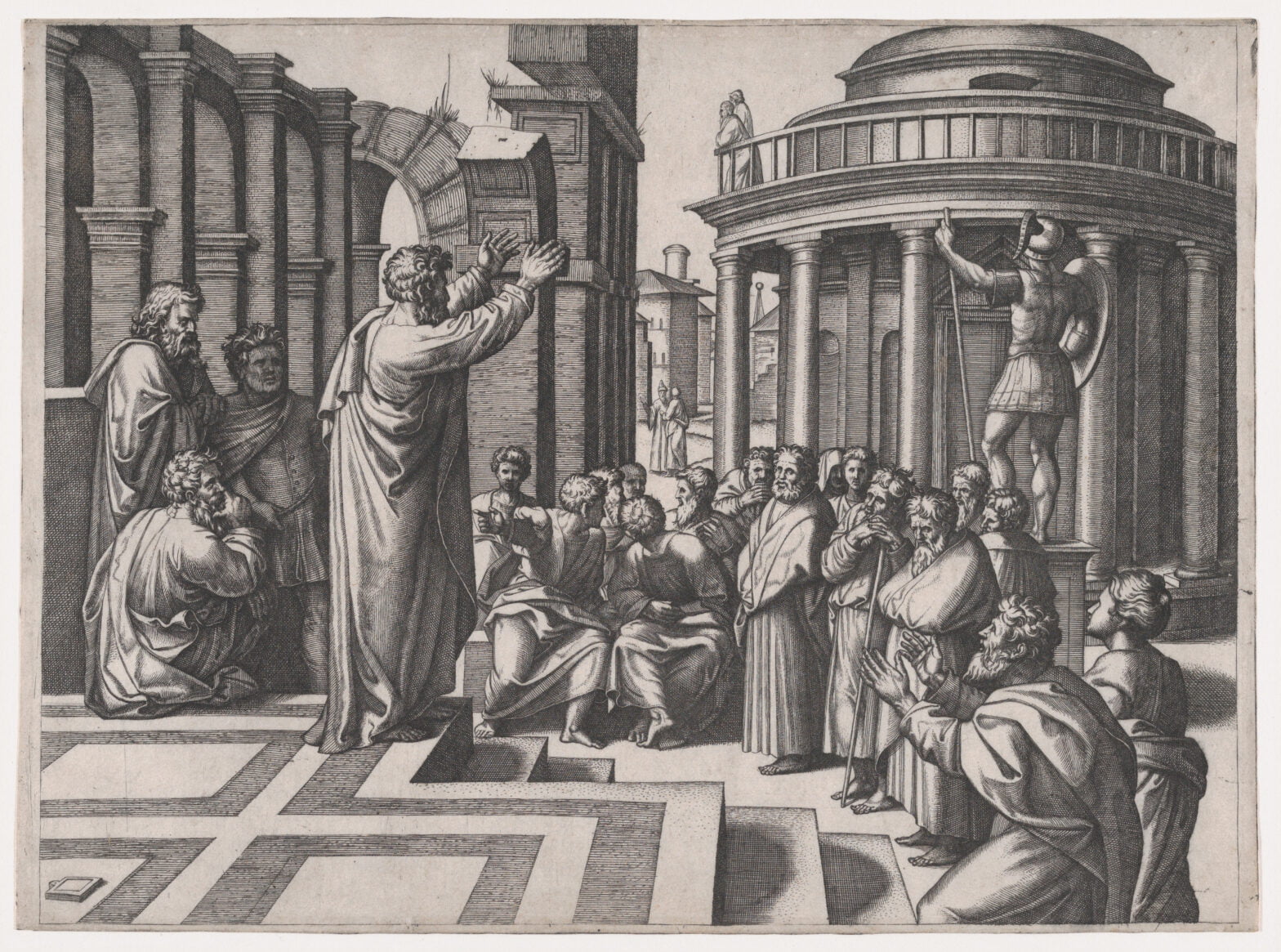Rhetoric and hermeneutics aren’t two separate things.1 Instead, they mirror and interpenetrate each other. As H.-G. Gadamer summarizes,
There would be no speaker and no art of speaking if understanding and consent were not in question, were not underlying elements; there would be no hermeneutical task if there were no understanding that has been disturbed and that those involved in a conversation must search for and find again together.2
This observation means that, in principle, one should be able to clarify hermeneutics by leveraging rhetoric and vice versa. A key case in point is how Aristotle’s concept of the enthymeme provides a way to gain purchase on Paul’s hermeneutic.
What Is the Enthymeme for Aristotle?
Authors have spilled a good bit of ink attempting to define what Aristotle means by the “enthymeme” that plays such an important role in his rhetorical theory. Aristotle calls enthymemes “the body of proof” (Rhet. 1354a [Freese, LCL]; σῶμα τῆς πίστεως) but nowhere explicitly defines the category.
The typical “textbook definition” tends to try to define enthymemes around either (a) their formal incompleteness in missing one or more premises or (b) their use of more tenuous premises. But Lloyd Bitzer helpfully situates the enthymeme by comparison to other types of syllogisms that Aristotle discusses. Bitzer suggests that
(1) Demonstrative syllogisms are those in which premises are laid down in order to establish scientific conclusions; (2) Dialectical syllogisms are those in which premises are asked for in order to achieve criticism; (3) Rhetorical syllogisms, or enthymemes, are those in which premises are asked for in order to achieve persuasion.3.
Thus, on Bitzer’s reading, the distinguishing features of the enthymeme are not its completeness or incompleteness or the kind of premises it involves. Rather, three features distinguish an enthymeme. These features are
- the context in which it occurs (rhetoric),
- the way its premises are obtained (asking of the audience), and
- the end toward which it is employed (persuasion).
The enthymeme is a deductive argument that occurs in a rhetorical context just like the example is an inductive argument that occurs in a rhetorical context (Aristotle, Rhet. 1356b–1357a, 1394a, 1419a).4
How Can Study of Enthymemes Clarify Paul’s Hermeneutic?
When it comes to Paul’s hermeneutic, Aristotle’s concept of the enthymeme proves particularly helpful by highlighting how Paul asks his audience for premises for his arguments.
Sometimes, Paul states those premises outright, sometimes he leaves them unstated. Similarly, Paul’s enthymemes sometimes involve him in scriptural interpretation, sometimes not. But when they do, the fact that he must ask for his premises means that his request discloses part of the hermeneutical world within which he and his audience understand their Scriptures.
This disclosure is not a slip or break in the argument, if one really wants to understand it. Instead, it’s an invitation to imagine how Paul might be correct.5
And a serviceable approach for accepting this invitation is to arrange the text’s claims into a standard syllogistic format. This format is often too cumbersome to use in a given rhetorical situation. But it provides a mechanism for highlighting the premise(s) that Paul may be requesting from his audience as he appeals to their shared scriptural tradition.
So, for instance, Romans 15:1–7 discloses three assumptions that Paul thinks are reasonable bases for argument that he shares with his audience.
- At least in certain places, the Messiah’s voice may be found in the psalmist’s.
- Experiencing insult and pleasing oneself are mutually exclusive.
- All Israel’s Scriptures may foster the perseverance, encouragement, and hope of Jesus’s followers.
Conclusion
As more work gets done along these lines a fuller picture emerges of the hermeneutic world within which early Jesus followers interpreted their Scriptures. That world has features that tend to look a bit odd to modern eyes. But as it comes progressively more into view, even those features that previously looked unlikely to fit may, in the end, make sense as well.
Would you like to read a fuller version of this discussion? If so, drop your email address in the form below, and I’ll send you a copy of my Trinity Journal essay that discusses this approach to Paul’s hermeneutic in more detail.
Header image provided by Wikimedia Commons. ↩
Hans-Georg Gadamer, “On the Scope and Function of Hermeneutical Reflection,” in Philosophical Hermeneutics, ed. and trans. David E. Ligne, 1st paperback ed. (affiliate disclosure; Berkeley: University of California Press, 1977), 25. ↩
Lloyd F. Bitzer, “Aristotle’s Enthymeme Revisited,” Quarterly Journal of Speech 45.4 (1959): 405; underlining added ↩
See also John Walt Burkett, “Aristotle, Rhetoric III: A Commentary” (Texas Christian University, PhD diss., 2011), 462–63; William M. A. Grimaldi, Aristotle: A Commentary, 2 vols. (affiliate disclosure; New York: Fordham University Press, 1980), 1:48; William M. A. Grimaldi, Studies in the Philosophy of Aristotle’s Rhetoric (Wiesbaden: Franz Steiner, 1972), 53–82. ↩
Hans-Georg Gadamer, Truth and Method, ed. and trans. Joel Weinsheimer and Donald G. Marshall, 2nd ed., Bloomsbury Revelations (affiliate disclosure; London: Bloomsbury Academic, 2013), 317. ↩

Leave a Reply